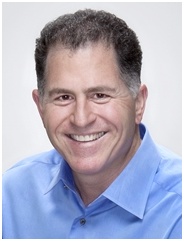Dell shareholders approve Michael Dell's $25-bn offer
13 Sep 2013
 Shareholders of PC maker Dell Inc today approved the offer by Michael Dell, backed by Silver Lake Partners to take the company private for $25 billion, ending six months of bitter opposition from billionaire activist investor Carl Icahn.
Shareholders of PC maker Dell Inc today approved the offer by Michael Dell, backed by Silver Lake Partners to take the company private for $25 billion, ending six months of bitter opposition from billionaire activist investor Carl Icahn.
Alex Mandl, head of a special Dell board committee, announced that a majority of shareholders had voted in favour of Michael Dell's $13.75 a share in cash offer and a special 13-cent dividend, a total of $13.88 a share.
Although Mandl did not reveal details of the vote, several media reports said that around 65 per cent approved the deal.
Mandl said in a statement: ''By voting in favour of the transaction, the stockholders have chosen the best option to maximise the value of their shares.''
Wining shareholders approval was a foregone conclusion after Icahn earlier this week threw in the towel when a Delaware court refused his plea to overturn changes to Dell's voting rules (See: Icahn bid to stall Dell's buyout offer fails).
"I am pleased with this outcome and am energised to continue building Dell into the industry's leading provider of scalable, end-to-end technology solutions," Michael Dell said. "As a private enterprise, with a strong private-equity partner, we'll serve our customers with a single-minded purpose and drive the innovations that will help them achieve their goals."
The transaction is expected to close before the end of Dell's fiscal third quarter.
Michael Dell had in February proposed to take private the company he founded in his dorm room in 1984, for $24.4 billion. (See: Dell founder seeks majority control with own funds).
Icahn, along with Southeastern Asset Management, who together hold nearly 13 per cent in the company, have been opposing Michael Dell's $13.65 per share offer, arguing that he is attempting to buy the world's third-largest PC maker at a steep discount. They also wanted the entire board replaced.
In order to derail Michael Dell's plan, Icahn had even urged shareholders to get their shares appraised in a Delaware court.
Dell's board had delayed voting on the deal three times as the transaction was sure to fail, but Micheal Dell and Silver Lake raised their bid in July by 10 cents, or a dime, to $13.75 a share on condition that the board tweaked the voting rules to not include unvoted stock as a negative vote in order to secure shareholder support. (See: Michael Dell raises offer by a dime to tweak voting rules)
The special committee dropped a rule that treats shares not cast either for or against the deal as votes against the deal. It meant that Michael Dell's 16-per cent stake could not be counted as an against vote., since being the bidder he had to abstain from voting.
A furious Icahn said that it was now impossible for him to stop the deal from going through and this week wrote in an open letter to the company's shareholders, ''What's the difference between Dell and a dictatorship?' The answer: Most functioning dictatorships only need to postpone the vote once to win.''
Michael Dell will now own about 75 per cent of the Texas-based company and remain its CEO, while Silver Lake will own the remaining 25 per cent.
Now the big question is whether Michael Dell can turn around the company in a post-PC era.
With the introduction of inexpensive tablets and low-end machines used primarily for consumption in mature and developed markets, the global PC and mini-notebook market has shrunk, denting the bottom line of PC manufacturers.
In its second quarter PC shipments report released in July, technology research firm Gartner said that global sales of PC's have fallen for the fifth quarter in a row, making it the "longest duration of decline" in history.
Gartner said that Dell's shipments for the quarter declined compared to a year ago, but its 2Q13 results showed a smaller decline than the past several quarters. Although Dell showed good growth in the US and Japan, it struggled to increase shipments in Asia / Pacific and the EMEA.
Research firm IDC projects tablet sales to surpass PC sales in the fourth quarter of this year.
Dell, which once ruled the global personal computer market, is now trying to move into the relatively unfamiliar field of enterprise computing services as sales of computers have shrunk in the face of increasing demand for mobile devices and laptops.
Michael Dell, has often said that he would like to restructure the company away from the critical eye of Wall Street by cutting costs and jobs, diversifying into the more profitable data storage and enterprise software business.
Although the PC business is dying and Dell missed the tablet boom, the company did see the coming of the cloud computing boom and invested around $14 billion in this segment.
This investment is expected to pay off in the coming years, and Dell has estimated a 15-per cent return on that investment.



















